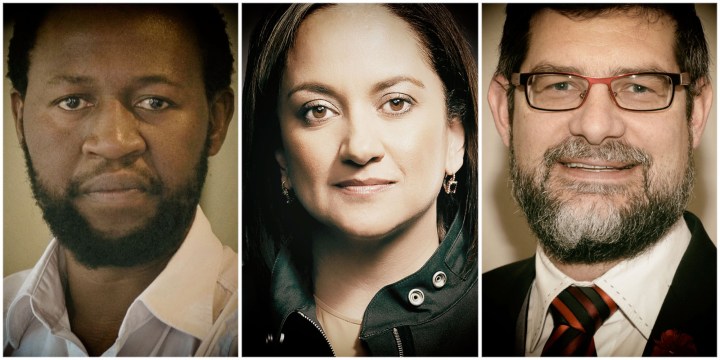DAILY MAVERICK WEBINAR
South Africans cannot afford to sit on the sidelines of our young democracy – experts say

The country has not done enough to build a participatory democracy, said experts in governance and law during a Daily Maverick webinar. To change this, they believe, we need to get young people to vote, while citizens should unlearn voting habits based on ethnicity, colour and historical legacy.
‘Sadly, we have not done the work in the country to build a participatory democracy,” said William Gumede, an associate professor in the School of Governance at the University of the Witwatersrand.
Gumede had been asked by webinar host and Daily Maverick associate editor, Ferial Haffajee, on Wednesday whether South Africa was a participatory democracy with active citizens. His fellow panellist was Geo Quinot, a professor of law at Stellenbosch University, and the discussion began with a video of former liberation activist and Constitutional Court justice Albie Sachs speaking about participatory democracy and the Constitution.
Read in Daily Maverick: ‘Unity in diversity’ – Justice Albie Sachs reflects on the importance of participatory democracy in SA
Gumede said many people and parties viewed the country’s Constitution in a “very narrow way”, which excluded participatory democracy. And there were many ways participatory democracy could be undermined, including viewing participation as street protests, or allowing political party leaders to participate on behalf of communities.
People could also use voting as a protest, Gumede added, where they might say that if they “are not being heard in a democracy, let me rather not vote”, or they might vote according to party loyalty.
Quinot did not “see participatory democracy in action” either, citing as an example a recent Constitutional Court judgment which said Parliament had “overwhelmingly failed in facilitating public participation” before passing the Traditional and Khoi-San Leadership Act.
Read more in Daily Maverick: ‘Major victory’ — activists and civil society hail judgment declaring Traditional and Khoi-San Leadership Act invalid
Pointing out that about 15 million eligible voters did not cast their ballots in the last elections, Haffajee asked what could be done to change this.
One way, Quinot suggested, would be to livestream parliamentary meetings, since it “makes it a little bit more real” when people see how decisions are made. Another would be to get citizens involved meaningfully in decisions that affected them, such as tracking service delivery.
The ‘trauma’ vote
Asked how South Africans should think about participatory democracy and coalitions in the run-up to the 2024 national elections, Gumede suggested that people “unlearn voting based on the past, or voting based on ethnicity, or you’re voting for someone based on their colour and you’re building solidarity based on this”.
“What you’re doing is undermining participatory democracy by voting on the past [and] not the present.”
Apartheid and a history of chronic unemployment were traumas that influenced politics, said Gumede, arguing that “civil organisations and political parties need to focus perhaps on unprocessed trauma and strengthening people’s self-love and agency so that people don’t vote on the basis of sort of trauma-bond voting”.
Quinot added that “the link between participation, agency and dignity” needs to “constantly be enforced”, and “whatever we call democracy or whatever element of democracy we’re talking about, passivity is not part of it”.
If we wanted to be in a democratic society, “that means everyone is actively involved, there’s no room to be a passenger… just sitting on the sidelines is not an option”. DM
The discussion was the first in a series of webinars and live debates planned by Daily Maverick in the run-up to the 2024 national and provincial elections. Topics will include getting people involved at a local level, reaching young people digitally and unlearning voting habits. DM
This webinar discussion was made possible thanks to the Inclusive Society Institute.



















 Become an Insider
Become an Insider
Comments - Please login in order to comment.